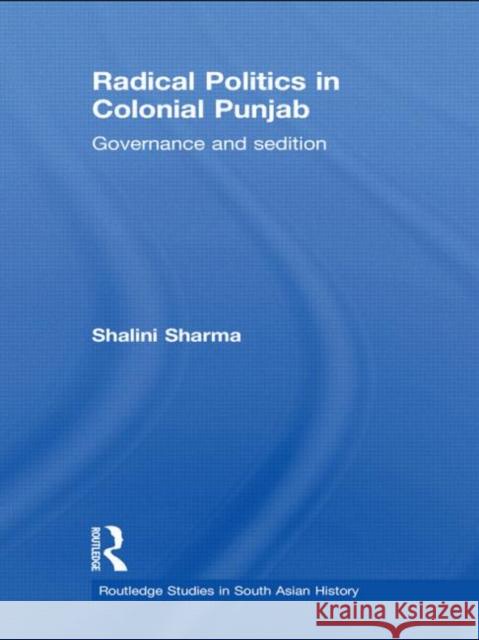Radical Politics in Colonial Punjab: Governance and Sedition » książka
Radical Politics in Colonial Punjab: Governance and Sedition
ISBN-13: 9780415456883 / Angielski / Twarda / 2009 / 176 str.
Radical Politics in Colonial Punjab: Governance and Sedition
ISBN-13: 9780415456883 / Angielski / Twarda / 2009 / 176 str.
(netto: 741,76 VAT: 5%)
Najniższa cena z 30 dni: 705,23
ok. 16-18 dni roboczych.
Darmowa dostawa!
The actions of the radical left in Punjab in pre-Independence India during the 1920s and 30s have often been viewed as foreign and quintessentially un-Indian due to their widely vilified opposition to the Quit India campaign. This book examines some of these deterministic misapprehensions and establishes that, in fact, Punjabi communism was inextricably woven in to the local culture and traditions of the region. By focusing on the political history of the organised left, a considerable and growing force in South Asia, it discusses the formation and activities of radical groups in colonial Punjab and offers valuable insights as to why some of these groups did not participate in the Congress movement during the run-up to independence. Furthermore, it traces the impact of the colonial state's institutions and policies upon these radical groups and sheds light on how and when the left, though committed to revolutionary action, found itself obliged to assimilate within the new framework devised by the colonial state. Based on a thorough investigation of primary sources in India and the UK with special emphasis upon the language used by the revolutionaries of this period, this book will be of great interest to academics in the field of political history, language and the political culture of colonialism, as well as those working on Empire and South Asian studies.
This book centres on the impact of the colonial state's institutions and policies towards radical politics in the Punjab in the 1920s and 30s. It addresses a gap in the literature on Indian history and offers a new understanding as to why some groups did not participate in the Congress movement during the run-up to independence. By focusing in particular on the political history of the organised left, a considerable and growing force in South Asia, the book discusses the formation and activities of radical groups in colonial Punjab.
Any translation of universal political ideas such as liberalism, communism and socialism, so the author, cannot be understood without counter-posing it to the colonial political culture in which it developed. Looking at the fight between those who desired to represent Punjab, she contends that the colonial administration and the organised left in Punjab permanently marked the institution of politics in Punjab. The colonial state and its Punjab variant set up the structure and space accorded to the specific sphere of politics. Conversely. it became the domain of the left groups in Punjab to advance the four edifices on which the newly independent Indian state would rest: namely, nationalism, secularism, social justice and especially democratisation.
This book will be of great interest to academics in the field of political history and language and the political culture of colonialism, as well as those working on Empire and South Asian studies.











